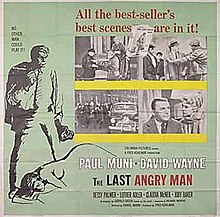The Last Angry Man
| The Last Angry Man | |
|---|---|
 Theatrical poster | |
| Directed by | Daniel Mann |
| Written by | Richard Murphy (adaptation) |
| Screenplay by | Gerald Green |
| Based on | Gerald Green (novel) |
| Produced by | Fred Kohlmar |
| Starring | Paul Muni David Wayne Betsy Palmer Luther Adler Claudia McNeil Joby Baker |
| Cinematography | James Wong Howe |
| Edited by | Charles Nelson |
| Music by | George Duning |
Production company | Fred Kohlmer Productions |
| Distributed by | Columbia Pictures |
Release dates |
|
Running time | 100 minutes |
| Country | United States |
| Language | English |
| Box office | $1,675,000 (US/ Canada)[1] |
The Last Angry Man is a 1959 American drama film that tells the story of a television producer who profiles the life of a physician. It stars Paul Muni (in his last film appearance), David Wayne, Betsy Palmer, Billy Dee Williams (in his film debut), and Godfrey Cambridge.
The movie was scripted by Richard Murphy from the novel by Gerald Green (who also adapted it), and was directed by Daniel Mann.
The movie was nominated for the Academy Award for Best Actor (Paul Muni) and Best Art Direction-Set Decoration, Black-and-White (Carl Anderson, William Kiernan).[2]
The film was remade in 1974 as an ABC Movie of the Week with Pat Hingle in the lead role.
Plot
[edit]As the fiercely dedicated general practitioner who tries to help the sick, the poor, and the unfortunate in his decrepit neighborhood, Dr. Sam Abelman is a testy old man who faces life without compromise and Woodrow Thrasher is a troubled television executive fighting to preserve his career.
Cast
[edit]- Paul Muni as Dr. Samuel "Sam" Abelman
- David Wayne as Woodrow "Woody" Thrasher
- Betsy Palmer as Anna Thrasher
- Luther Adler as Dr. Max Vogel
- Claudia McNeil as Mrs. Quincy
- Joby Baker as Myron Malkin
- Joanna Moore as Alice Taggart
- Nancy R. Pollock as Sarah Abelman
- Billy Dee Williams as Josh Quincy
- Robert F. Simon as Lyman Gatting
- Dan Tobin as Ben Loomer
Reception
[edit]Paul S. Cowan of The Harvard Crimson wrote that the film "combines some of the finest motion picture effects with many of the worst."[3]
Variety wrote that the lead actor "gives a superlative performance."[4]
See also
[edit]References
[edit]- ^ "Rental Potentials of 1960", Variety, 4 January 1961 p 47. Please note figures are rentals as opposed to total gross.
- ^ "The Last Angry Man". Movies & TV Dept. The New York Times. 2010. Archived from the original on 2010-08-28. Retrieved 2008-12-23.
- ^ Cowan, Paul S. (1959-10-30). "The Last Angry Man". The Crimson.
- ^ "The Last Angry Man". Variety. 1958-12-31. Retrieved 2020-03-20.
External links
[edit]- The Last Angry Man at IMDb
- The Last Angry Man at Rotten Tomatoes
- The Last Angry Man at the TCM Movie Database
- 1959 films
- 1959 drama films
- American drama films
- Columbia Pictures films
- American black-and-white films
- Films scored by George Duning
- Films about physicians
- Films about television
- Films based on American novels
- Films directed by Daniel Mann
- Films set in Brooklyn
- 1950s English-language films
- 1950s American films
- English-language drama films
- 1950s drama film stubs
- 1950s American film stubs
